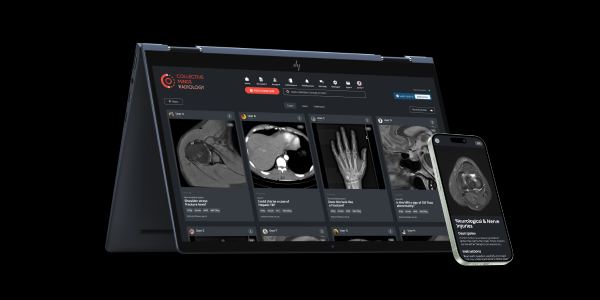Why online case-based learning is the future of radiology education and how Collective Minds Education can help you achieve it

Radiology education is facing a crisis of relevance and quality in the 21st century. The rapid advances in technology, the increasing complexity of clinical cases, and the growing expectations of patients and society require radiologists to constantly update their knowledge and skills, and to adapt to new challenges and opportunities. However, the traditional methods of teaching and learning, such as lectures, textbooks, and exams, are not adequate to meet these demands. They are often passive, isolated, and standardized, and do not reflect the real-world practice of radiology, which is active, collaborative, and personalized.
To bridge this gap, there is a need for a new pedagogical approach that can foster the development of clinical reasoning, problem-solving, and lifelong learning skills in radiology learners and teachers. One such approach is online case-based learning (CBL), which is a method that uses real or simulated clinical cases as the basis for learning.
Online CBL has been widely adopted in medical education, especially during the COVID-19 pandemic, as it offers several advantages over conventional CBL, such as accessibility, flexibility, and collaboration. However, online CBL also poses some challenges, such as technical issues, distraction, and communication barriers. Moreover, there is a lack of evidence on the effectiveness, perceptions, and learning theories of online CBL in medical education.
To address this gap, Donkin et al conducted a scoping review of the literature on online CBL in medical education, published between 2010 and 2022. They searched various databases and identified 13 articles that met their inclusion criteria. They used the CASP appraisal tool to assess the quality and rigor of each study. They found that most studies were observational and descriptive, and reported positive perceptions and outcomes of online CBL. The benefits to radiology education could be summarized as:
- It enhances the retention and transfer of knowledge, by providing authentic and meaningful contexts for learning, and by activating prior knowledge and linking new information to existing schemas.
- It improves the application and integration of knowledge, by requiring learners to analyze, synthesize, and evaluate information from multiple sources and perspectives, and by facilitating the transfer of knowledge from theory to practice.
- It stimulates the motivation and engagement of learners, by providing them with autonomy, choice, and feedback, and by appealing to their curiosity, interest, and relevance.
- It promotes the collaboration and communication of learners and teachers, by creating opportunities for social interaction, peer feedback, and collective reflection, and by building a sense of community and belonging.
Online CBL also has some advantages over conventional CBL, such as:
- It can provide access to a large and diverse pool of cases, covering various modalities, specialties, and levels of difficulty.
- It can facilitate collaboration and communication among learners and teachers, regardless of their geographical location and time zone.
- It can incorporate novel technologies, such as artificial intelligence (AI), to enhance the learning experience and outcomes.
- It can offer flexibility and convenience for learners and teachers, who can access the cases anytime and anywhere, using any device.
However, online CBL also faces some challenges, such as:
- It requires a reliable and user-friendly platform that can support the delivery, management, and evaluation of online CBL activities.
- It demands a high level of engagement and motivation from learners and teachers, who need to actively participate and contribute to the online CBL community.
- It depends on the quality and relevance of the cases, which need to be carefully selected, curated, and updated to reflect the current standards and practices of radiology.
To address these challenges and maximize the potential of online CBL, we introduce Collective Minds Education, a cloud-based collaboration platform for radiology education, powered by Collective Minds Radiology. Collective Minds Education is designed to take your radiology education to the next level, by offering the following features and benefits:
- A professional-grade image viewer that allows you to view and manipulate high-quality images from any device, with tools for annotation, measurement, and comparison.
- A global network of radiologists, who can share, discuss, and collaborate on radiology cases, with options to create and join groups based on your interests and needs.
- A rich collection of published cases, spanning all modalities and specialties, with expert commentary and discussion, which you can use for your online CBL activities, or supplement with your own private cases.
- A quiz and exam module that enables you to create and administer quizzes and exams based on the cases, with automatic or manual correction and feedback, to assess your learning progress and outcomes.
- A data protection and security system that ensures the privacy and confidentiality of your patients and data, using GDPR-compliant privacy-by-design technology that de-identifies and pseudonymizes your data before transfer and storage.
- A discovery and validation platform that allows you to explore and evaluate various AI algorithms from our partners, using your own data, and collaborate and communicate with the AI experts and your peers.
Collective Minds Education is more than just a platform, it is a community of radiology learners and teachers, who are passionate about improving their knowledge and skills and advancing the field of radiology. By joining Collective Minds Education, you will have access to a world of radiology cases, experts, and tools, that will enrich your online CBL experience and outcomes.
If you are interested in learning more about Collective Minds Education please go ahead and book a demo with us below. We look forward to hearing from you and welcoming you to our community.
Pär Kragsterman, CTO and Co-Founder of Collective Minds Radiology

Reviewed by: Anders Nordell on October 16, 2024




